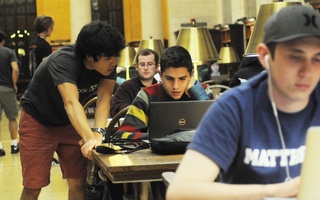For the first time in many years, change is coming to Harvard Yard’s historic Widener Library. According to Sarah E. Thomas, vice president of the Harvard Library system, Widener will close at midnight rather than 10 p.m. on weekday evenings for this academic year.
The announcement served as yet another reminder of the growing campus presence of Computer Science 50: Introduction to Computer Science, the popular undergraduate course. The policy change, Thomas said, came in direct response to a request from David J. Malan ’99, the professor and public persona behind the course. A record-breaking 818 undergraduates enrolled in the class last fall. This semester, Widener’s Loker Reading Room will host the teaching staff’s office hours until closing on Mondays and Tuesdays.
On its own, the policy change is commendable. The new hours will line up Widener’s hours more closely with many undergraduates’ study schedules, making the library a more attractive alternative to Lamont for all students, regardless of whether they are enrolled in CS50.
But the path to the policy change is troubling. The University already has a system for courses to reserve rooms and study spaces. To allow a single course to work around the rules, regardless of its popularity, sets an undesirable precedent, signaling that Harvard deems some courses and departments more important than others.
Professor Malan offered a less-than-convincing explanation for why the course needs special access to Loker, as opposed to the larger Annenberg Hall, which it has used for office hours in the past. “[Loker is] a beautiful space,” he wrote in a July email to a Crimson reporter, "it's well lit, and it's well equipped with plenty of seats and power outlets for students.”
This change is particularly noteworthy because of the history of special treatment afforded to CS50. The Administrative Board, for example, has allowed the course to circumvent simultaneous enrollment rules, and CS50’s so-called regret clause allows students to avoid more serious punishment for violations of academic integrity.
Over the past week, posters and social media posts have parodied the yearly hype surrounding the course, using the hashtag #notcs50. This phenomenon responds to a tension that many Harvard students feel between what Dean of the College Rakesh Khurana might call the University’s interest in a “transformational” education, and the rise of courses that appear “transactional” or pre-professional. Over the past few years, Harvard has signaled on several occasions that it fears losing ground to its competitors in computer science and engineering, a problem that is inextricably tied to the fundraising arms race in higher education today.
The question of access to Widener Library, the landmark that may best represent Harvard’s historic identity, seems to represent a much larger debate. How much of the traditional Harvard must pass away for the university to remain a leading light in the twenty-first century? The fundamental question is not just about fustiness versus openness, as CS50 would have us believe; it’s about transformation versus transaction, too. Students should be glad that Widener is more open to them than ever before. But they shouldn’t celebrate that Harvard has slid another inch from its historic identity as a champion of all the liberal arts, not just the profitable ones.
Read more in Opinion
Markey Missing the Mark on Ending AIDSRecommended Articles
-
The CS50 ModelCS50 is not a fluke. The methods that turned the course into an academic juggernaut with top Q ratings and astronomical enrollment figures—in spite of ostensibly abstruse subject matter and an infamously taxing workload—can be applied across the Harvard curriculum.
-
CS 50 Office Hours To Move To AnnenbergStarting this semester, Computer Science 50: “Introduction to Computer Science I” office hours will be held in Annenberg to facilitate interaction between students and the course staff.
-
 This Is CS50.
This Is CS50. -
 Widener Will Extend Nighttime Hours for CS50
Widener Will Extend Nighttime Hours for CS50 -
 Students Cancel ‘Take Back Widener’ Mock CS50 Protest
Students Cancel ‘Take Back Widener’ Mock CS50 Protest













